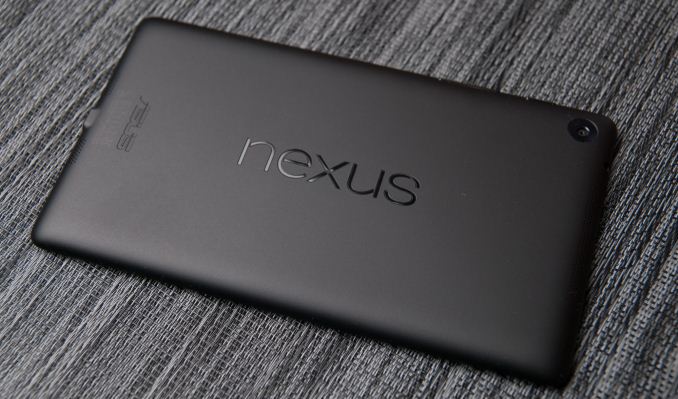Nexus 7 (2013) - Mini Review
by Brian Klug on July 27, 2013 12:54 AM EST- Posted in
- Tablets
- Snapdragon
- Qualcomm
- Android
- Mobile
- APQ8064
- Nexus 7
- Android 4.3
I hesitate to do quick turnaround reviews of products, that’s why this is a short review and Anand is hopefully going to take a longer look at the Nexus 7 (2013). From the time that I’ve spent with the new Nexus 7 however, I think it’s safe at this point to deem it more than a worthy successor to the tablet that not only dominated its form factor for its entire run, but proved that 7-inches was probably the right size for Android tablets. The display is excellent, and at present the best in its 7–8 inch class, beating even the iPad mini in terms of GMB Delta-E 2000 and resolution. Performance is great, build quality is great, and the whole affair runs stock, unadulterated Android 4.3.
The new Nexus 7 is everything a generational refresh should be – performance goes up dramatically, issues were fixed (storage), features were added (5 GHz WiFi, rear facing camera, Qi charging, high DPI display), and it’s all in a thinner and lighter form factor. Everything about the OG Nexus 7 is better in the 2013 model, all while keeping basically the same price point, and we haven’t even looked at the 4G LTE enabled version yet which adds the right kind of operator-agnostic LTE bands for two regions that I’ve been begging for. It’s undeniable that Google is doing something right with the Nexus program, and along with it, hardware partner ASUS.











252 Comments
View All Comments
phillyry - Tuesday, July 30, 2013 - link
Anand also mentioned that it's possible for the different capacities to have different eMMC controllers.However, they didn't last year.
Would be good to know for this year's models.
Broo2 - Saturday, July 27, 2013 - link
There should not be a difference and the 16GB/32GB flash is used only for storage.phillyry - Tuesday, July 30, 2013 - link
Did you read the article?Brian addressed the real lagging issues that Nexus 7 gen. 1 users have been having. He stated that it was likely caused by the storage I/O and that it should be fixed via software.
Point is, storage is usually the performance bottleneck of a system.
et20 - Saturday, July 27, 2013 - link
Thanks for the review.I really appreciate it much more than your standard review format.
I only read those if I'm 90% sure I want to buy the product because they are too long.
phillyry - Tuesday, July 30, 2013 - link
+1Ya, we should have this short, sweet, and immediate reviews initially for all major products.
TareX - Saturday, July 27, 2013 - link
I enjoyed having an Nexus 7 (till it became unbearably buggy, slow, and eventually broke with no trauma)... but I must say, walking around with two Androids is extremely cumbersome. Having apps and files scattered between two devices is annoying... This lead me to the conclusion that I need to invest in a phablet. It comes with the added advantage of excellent battery life on your one and only Android. That said, a viable alternative would be an affordable version of ASUS' Padphone product. But their screen dock is ridiculously overpriced, I can only see a +5.5" phablet as my only choice here. I hope the HTC One Max comes with a split-screen functionality so I wouldn't have to go for the Note III.torp - Saturday, July 27, 2013 - link
How about comparing wifi signal between the nexus 7 old and nexus 7 new? There are spots in my home where the old nexus 7 simply doesn't work, and it's not a big home.Brian Klug - Saturday, July 27, 2013 - link
Good question, I was never a huge fan of the Azurewave WLAN combo inside the original Nexus 7, I believe WCN3660 and its front end might be better. I would need to compare FCC disclosures and do some testing to find out, unfortunately most mobile devices are pretty constrained, and perform around the same (outliers being those with poor enclosure designs).-Brian
torp - Sunday, July 28, 2013 - link
Oh forgot an important data point: i also have an iPad 1 and that one has no problems with wifi anywhere in my home... so basically I could say the nexus 7 old's wifi was a bit crap :)zepi - Saturday, July 27, 2013 - link
When you do a battery life test, could you run one test at much higher brightness level than the standard? On my 3rd Gen iPad I've noticed that the device really struggles with max brightness setting that is more or less required when using the device outside in sunshine.Unlike often far too hefty laptops, people actually carry their tablets around want to use them things on their patios, balconies and outdoor cafeterias.
Otoh, it's not just the peak brightness, but overall visibility and readability of the screen that'd need to be normalised for such testing. Contrast ratios of screens can vary greatly under plentiful exposure to external light, as manufacturers employ different coatings and "clearblack" technologies, not to mention oled vs tft etc.